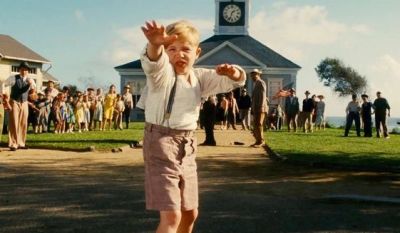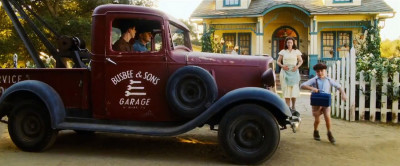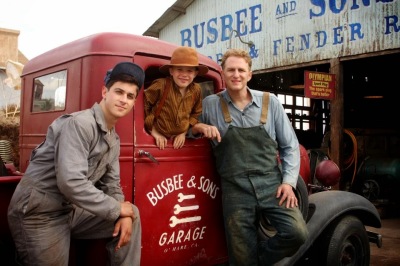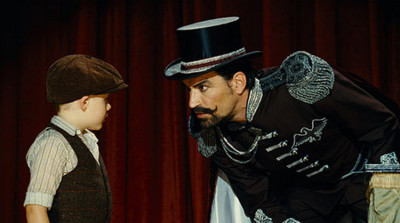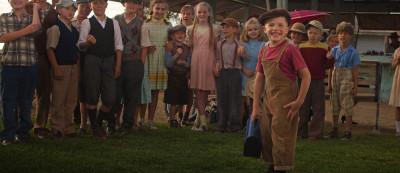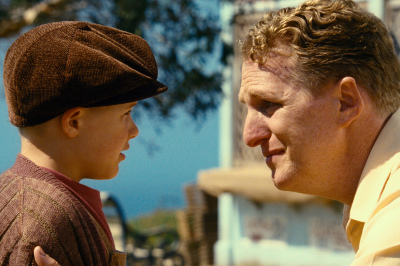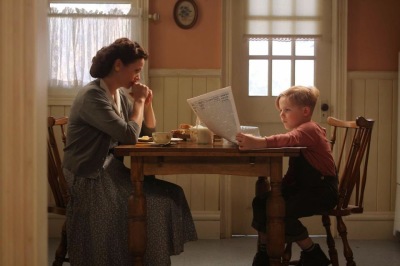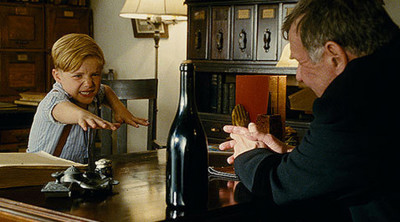Leave it to Executive Producers Roma Downey and Mark Burnett to bring us the “melt your heart film of the year” with writer/director Alejandro Monteverde’s LITTLE BOY. Set in a small coastal California town in the midst of 1940’s WWII, LITTLE BOY is the most uplifting, hopeful and faith restoring film to come around in a long while, due not only to the thematic elements of the script, but the beautiful lensing of cinematographer Andrew Cadelago and the dignified restraint of the more mature actors serving as a perfect balance to the scene stealing endearment and charm of Jakob Salvati as LITTLE BOY.
Always the butt of jokes around town by classmates and adults alike, and constantly bullied thanks to his rather diminutive stature, 7-year old Pepper is known to all as “Little Boy”. He lives in a nice home with his mother Emma, father James and older brother London. His father and brother run the local garage, Busbee & Sons. Pepper is loved by his parents, but more than anyone, by his dad, who is not only Pepper’s best friend, but his only friend. Together they share the adventures of comic book hero, magician Ben Eagle. Life is really pretty perfect for Pepper. Until the US enters WWII.
When London is declared 4F, it falls to James to do his duty to the town and to country and enlist. With James sent to fight in the Japanese-occupied Philippines, Pepper is heartbroken, but believes, just as James promised, that his father will come home. But the day comes when the military vehicle arrives at the Busbee home. James is “missing”. While there is no evidence that he is dead or alive, the fear is that he has been taken prisoner by the Japanese. Emma refuses to believe James won’t return. London is convinced his father is dead. And Pepper, well Pepper, believes, believes with all his heart, that his father will return. However, that faith wanes and gets challenged.
Thanks to an in-person appearance by Pepper’s beloved comic book character Ben Eagle himself in the local theatre, Pepper gets a lesson in the power of faith, the power of a tiny mustard seed to move mountains. If a tiny seed can move mountains, why can’t Pepper bring his father home on shear faith. Can Pepper believe enough to bring his father home? After performing an amazing feat at the hands of Ben Eagle, Pepper believes he can. But when James doesn’t come home right away despite all of Pepper’s attempts to “believe him home”, he goes to Father Oliver questioning “why”. The kindly pastor knows a little lamb in need of guidance when he sees one and so he gives Pepper a list of tasks he must complete to prove he really believes. Among the tasks are feeding the hungry, sheltering the homeless, clothing the naked, visiting the sick and an added task – befriending Mr. Hashimoto, a Japanese-American man who lives in the community but who is called “dirty Jap” and bullied by hatred and torment of the locals, including Pepper’s brother London. Hashimoto, who is friends with Father Oliver, agrees with the Father to “help” Pepper accomplish his list of tasks.
Predictably, wondrous things start to happen as Pepper embraces his tasks. A smile returns to his face, he makes people happy and above all, he finds a friend in Mr. Hashimoto and helps turn the tide of hatred – in most. But still, James Busbee doesn’t return home. In the meantime, much to the chagrin of London and Pepper, the local physician Dr. Fox, has his eye on Emma Busbee and tries to insert himself into her life and theirs. Just one more reason that Pepper needs to bring his dad home – fast. And then the most wondrous, yet sobering, thing of all happens. (Get out your history books folks.) “Little Boy” is dropped on Japan. As everyone believes this means the war will end, does it indeed mean that Pepper’s dad will come home?
Directed by Alejandro Monteverde and co-written by Monteverde and Pepe Portillo, LITTLE BOY doesn’t shy away from the horrors of war both on the homefront and on the battlefield, the latter of which we see play out in flashbacks which tell James’ story overseas. Powerful, indelible dark imagery that stays with you, prompting pause for thought and discussion over the power of prayer, the benevolence of God, serves as a striking juxtaposition to the inspiration and lighter visual tone the film gives through the character of LITTLE BOY. It should be noted that while the film is set during WWII, and while it does include some pivotal moments from the Pacific front and key elements of the war as a whole, the film is not written as nor meant to be a historically factual film. LITTLE BOY is about the power of faith, belief, positivity and yes, kindness. And that’s where Monteverde soars.
One look at Jakob Salvati as Pepper Busbee and your heart smiles. Salvati has a smile as wide as the ocean and is so engaging, so pure, so real, you feel his heart and determination in bringing Pepper to life. And then he adds this spunk that is pure delight.
Forming an interesting triumvirate around Salvati are Tom Wilkinson as Father Oliver, Michael Rapaport as James Busbee and Cary-Hiroyuki Tagawa as Hashimoto. Salvati’s chemistry with each is powerful and genuine. There is a truth that resonates. Rapaport is standout as the fun-loving adventurous dad while Wilkinson adds touches of paternal whimsy to connect with a 7-year old that is endearing. But it’s Tagawa and his scenes with Salvati that speak the loudest with the fewest words. Restrained, proud, soft-spoken and kind, Tagawa stands tall in the film’s construct. Standout is Emily Watson who gives Emma a quiet dignity that rises above some of the more loosely constructed “miracles” within the film. She is the film’s grounding.
Annoying, and meant to be so, is Kevin James as Dr. Fox. The only word to describe him as Fox is “skeevy”. David Henrie is making the transition to more adult roles since “Wizards of Waverly Place” and does so here quite effectively. Henrie finds that roughneck, teen angst we more often associate with the bikers of the 50’s but digs a little deeper to put meaning behind London’s own fall from grace and ultimate redemption.
Shooting on 35mm film and using Panavision Primo lenses gives LITTLE BOY a warm, golden palette that tacitly captures the era with that “filmic” grain while adding slightly saturated color to elicit the wonder and “magic” of LITTLE BOY himself. It’s a beautiful visual design that cinematographer Andrew Cadelago takes to beauteous heights with widescreen sunsets. Bernardo Trujillo’s production design simply charms with period perfect simplicity.
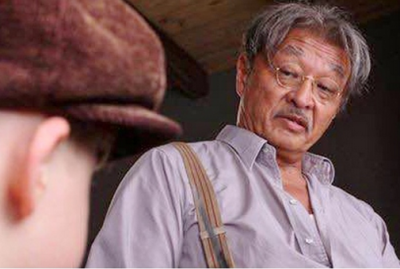
Distracting to the film, however, are too oft repeated images of naysaying onlookers in the town, in which there is no movement or noise but rather, just empty facial expressions. Similarly, the overused voiceovers take away from the simplicity and purity of Pepper’s belief and the thematics of faith. Scoring is also uneven and sometimes inappropriate for the emotion of a scene which may be due in part to two composers at play, Stephan Altman and Mark Foster.
But at the end of the day, be bit a mustard seed or a little boy, sometimes all it takes is the belief in oneself and others to move mountains or, make a movie like LITTLE BOY. Tissues, people. Lots and lots of tissues. There won’t be a dry eye in the house.
Directed by Alejandro Monteverde
Written by Alejandro Monteverde and Pepe Portillo
Cast: Jakob Salvati, Emily Watson, Michael Rapaport, Tom Wilkinson, Cary-Hiroyuki Tagawa, Kevin James, David Henrie

